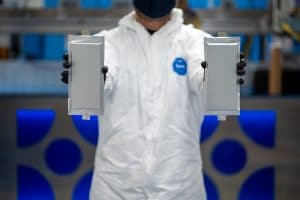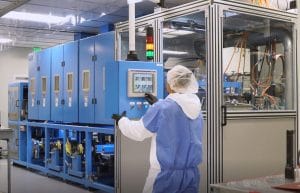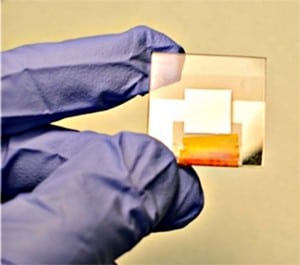
Ford Motor Co. and BMW are teaming up to make a big investment in the development of solid-state batteries, a technology widely expected to address many of the key obstacles to widespread EV adoption, including range and charging speed, while also eliminating the risk of battery fires.
The Bavarian automaker first invested in Colorado-based Solid Power in 2017, Ford followed up with its own investment in the startup two years later. The two automakers expanded their ties and, with this new $130 million Series B investment round, BMW is now an equal equity owner with its Detroit partner.
The announcement is just the latest sign that the auto industry sees solid-state technology as a proverbial game-changer, a technology that will make battery-electric vehicles competitive with, and even superior to, products powered by internal combustion engines.
“Solid-state battery technology is important to the future of electric vehicles, and that’s why we’re investing in it directly as well as accelerating Ford’s in-house R&D on next-generation battery technology,” said Hau Thai-Tang, Ford’s chief product platform and operations officer.

Auto industry sees solid-state as the next breakthrough
Ford last week announced the establishment of a new facility, dubbed Ion Park, to develop and test advanced battery technology. Among other things, the automaker will use the facility to determine whether it should begin manufacturing its own batteries, rather than relying on outside suppliers. Ion Park will put a particular emphasis on solid-state technology, Thai-Tang said at the time.
BMW has similar aspirations for the next-generation batteries — but so do plenty of other automakers.
Toyota has been working to bring solid-state technology to market, though it has been vague about setting a specific timetable.
Its Japanese rival, Honda, last month laid out plans to rapidly accelerate its shift to electric propulsion and said the goal is to use solid-state batteries for the new e:Architecture platform it is developing. That could happen by mid-decade, Honda indicated.
“Toward these targets, Honda also plans to launch a series of new EV models based on a new e:Architecture, beginning from the second half of the decade,” the company said in a statement April 23.

The basics
Along with major manufacturers like Ford, BMW, Toyota and Honda, a number of startups and existing battery manufacturers are working on the technology. As with today’s lithium-ion batteries, solid-state technology could take numerous forms with a variety of different chemistries.
At the most basic level, however, solid-state batteries replace the chemical slurry found in traditional batteries with, as the name suggests, something more solid. This could include a ceramic “substrate,” or a variety of other materials.
Though production for commercial applications has yet to begin, companies like Solid Power claim development is rapidly approaching that critical point. Equally important, many of the developers say their solid-state batteries could be produced using the same, basic facilities now producing lithium-ion batteries. That would not only reduce the cost of converting plants but also speed up the transition.
Plenty of potential advantages
By replacing the highly flammable liquid in lithium cells, proponents believe solid-state would all but eliminate the risk of battery fires, like the one that followed the recent crash of a Tesla that killed two occupants.

There are plenty of other advantages, as well. Solid-state batteries are expected to be smaller and lighter than lithium-ion cells, meaning smaller packs yielding greater range and performance. For its part, Solid Power claims an “energy density” 50% greater than the best of today’s lithium batteries.
Another goal is to speed up charging times. One of the industry’s Holy Grail targets is being able to fully recharge a drained battery of around 250 to 300 miles range in under 15 minutes, approaching the speed with which a gas-powered vehicle of the same range could have its tank refilled.
“By simplifying the design of solid-state versus lithium-ion batteries, we’ll be able to increase vehicle range, improve interior space and cargo volume and ultimately deliver lower costs and better value for customers,” said Ted Miller, Ford’s manager of electrification subsystems and power supply research.
Driving down costs
Cost is the other big bogey. When the first plug-in vehicles using lithium-ion technology came to market a decade ago, the batteries cost as much as $1,000 per kilowatt-hour. Today, according to Boston Consulting Group (BCG) and other experts, that’s down to about $150. In a vehicle like the Chevrolet Bolt EV, with a roughly 65 kWh pack, that translates into a savings of more than $50,000. But BEVs are still more expensive than models using gas engines.
General Motors hopes to get down to around $100 per kWh with its new Ultium lithium-ion cells. But BCG estimates batteries will need drop to $70 to cross the line where BEVs become cheaper than traditional automobiles. The general consensus is that it will take solid-state or some other breakthrough technology to get there.
It remains uncertain when solid-state will be ready for prime time, but the new funding round for Solid Power offers some clues. As part of the agreement, Ford and BMW will start receiving full-scale 100 amp-hour batteries next year. These will be used, said Ford in a statement, “for testing and integration into its future vehicles.”







